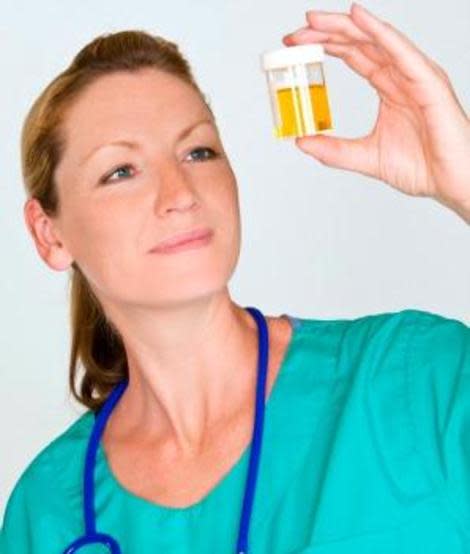Can Peeing in a Cup Reveal If You Have Breast Cancer?
by Cristina Goyanes for SHAPE.com

Between the news of Angelina Jolie's double mastectomy and her maternal aunt's recent passing from the disease at age 61, many of us have breast cancer on the brain. Whether or not it runs in the family, as in Jolie's case, nearly 1 in 8 women will develop breast cancer during their lifetime, and it's scary to think that this Russian roulette-like diagnosis is out of your hands. One silver-lining is that scientists are looking to make early detection as simple as peeing in a cup.
A new study from Missouri University of Science and Technology revealed that a screening method may detect breast cancer in a small urine sample. In the blind study of 300 breast cancer patients and 100 cancer-free participants, researchers used a device called a P-scan to look for an abnormally high concentration of metabolites called pteridines in the urine samples. While pteridines are always present in humans, high levels can indicate cancer, and the higher the levels, often the more aggressive the cancer.
Although this test isn't exclusive to breast cancer, lead researcher Yinfa Ma, Ph.D., hopes to perform many future trials to see if this method is an accurate way to detect and diagnose other types of cancer too.
RELATED: 5 DIY Health Checks that Could Save Your Life
"This is very exciting news. If it works, you don't need a needle, a mammogram, or any sort of expensive imaging to initially detect cancer," says Alice M. Police, M.D., a surgical oncologist at the University of California, Irvine and the medical director of Pacific Breast Care. "We know we can't capture the cancer cells themselves in urine or blood, but we can capture pteridines, which are basically the cancer cells' poop."
While Dr. Police is thrilled about the new developments, she has a few concerns.
"What happens if the urine sample finds cancer but no cancer shows up in the mammogram because it's not at least a centimeter in size so we can't see it?" she asks. "And since the test may not be specific to breast cancer, there's a chance you might not be able to find the cancer and, therefore, you can't diagnose or treat it, which would be pretty distressing to the patient."
In other words, what would positive P-scan results mean? Until researchers can find these answers and develop a way to read the results-such as offer percentages for the likelihood of false positives or pre-cancer-it may be years before the P-scan will be commercially available to the public.
One thing's for sure, this new test will never replace the mammogram. "Mammograms are time-consuming, expensive, and, for some people, very painful, but they are crucial to the diagnosis process, especially since they are 85 to 90 percent accurate," Dr. Police says. "At best, the P-scan will be an easy, convenient and affordable supplement to the mammogram," she adds.
RELATED: The No. 1 Reason to Check Your No. 2
The urine test may also be a viable solution for those who don't want to wait until age 40 (the recommended age to start annual mammograms) to test for early signs of breast cancer.
More on SHAPE:
15 Exercises a Trainer Would Never Do
7 Slimmed-Down Salad Dressings
How Your Liver May Be Your Best Weight-Loss Tool
